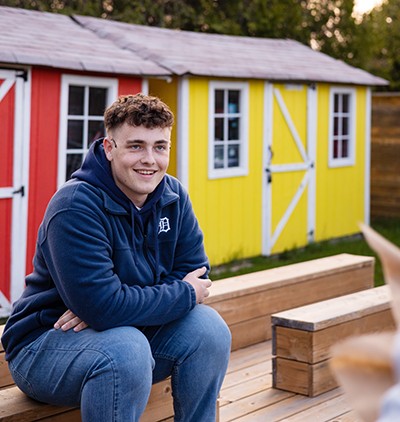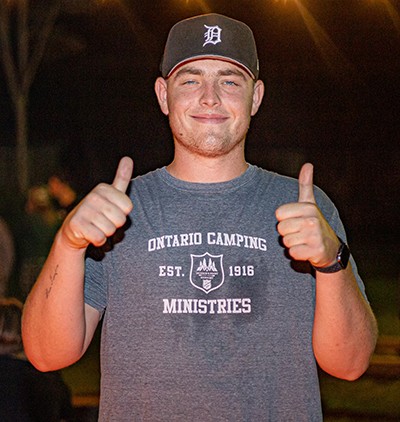Though he grew up in a Salvationist family, attending Oshawa Temple, Ont., Matthew Zimmerman never liked going to church. “I hated it, honestly,” he admits. “I didn’t fit in.”
But one summer, after reluctantly taking a maintenance job at Jackson’s Point Camp, Ont., he met a young camper who made all the difference. He felt God moving in his life for the first time, and it took an unlikely friendship with a nine-year-old to show him what he was missing.
“I can confidently say that camping ministries is the best ministry I have seen within The Salvation Army. It is one that I wholeheartedly believe in and one that I have seen change lives. It has changed my own life,” says Zimmerman. “I would not be here, I wouldn’t have my current job—I wouldn’t even have my faith if it weren’t for camp. And that is something I am so grateful for.”
Today, Zimmerman is the children and youth program co-ordinator at North Toronto Community Church, where he ministers to young people on their journeys of spiritual development. He is committed to thinking outside the box of traditional youth ministry so that every kid, even resistant ones like him, can experience God in their own unique way.
Like Oil and Water
Zimmerman’s grandparents were SalvationArmy officers, and he grew up attending church, first at Hope Community Church in Ajax, Ont., and later at Oshawa Temple. He attended Sunday school and half-heartedly listened to the sermons but was never involved in other ministries.
“At Oshawa Temple, especially back then, music was a big deal, with active banding and songsters. I tried, but I didn’t fit into music ministry. I struggled to find a place to belong and a sense of purpose,” he says. “I struggled for a few years. I wasn’t involved in anything. My parents would encourage me to get involved but I just didn’t feel connected.”
At the time, Zimmerman’s neighbour was also a Salvationist and the bandmaster at Scarborough Citadel in Toronto, and she would often bring Zimmerman and his brother to band practice on Tuesday night, hoping they would take a liking to it. “We did that for two years and it was just not my thing,” he says.

One summer, he went to a week of junior music camp at Jackson’s Point, but only because his brother showed an interest and didn’t want to go alone. “I knew about Jackson’s—my dad worked there for about 10 years—so I knew what camp was all about, but it just wasn’t on my radar,” he explains.
The Zimmermans are good friends with Majors Mark and Jodi Dunstan, who were running camping ministries as divisional youth secretaries in Ontario at the time, and when the Dunstans realized that they were short a maintenance staff member one summer, they reached out.
“On a day’s notice, I went up,” Zimmerman says. “It was the middle of orientation week. Everyone had already been there, and I didn’t know a single person. I didn’t know what I was stepping into. I just knew that I had to cut grass, and I thought, It’s something to do over the summer. It’s going to be fine.”
The Shift
Initially, Zimmerman wanted to go home. For the first three days he texted his parents to come and pick him up. But by the end of the summer, he had experienced a transformation.
“I was nervous going to camp. I worried I wouldn’t know anybody. But when I got there, I began to recognize people from Oshawa Temple, or people I had met from the band at Scarborough Citadel,” he says. “But to be honest, at that point, I didn’t have a faith. I was just a churchgoer, not somebody who had a relationship with God. I thought, How am I possibly going to relate to any of these people?”
For Zimmerman, there were two shifts that took place at camp—one social, the other spiritual.
The first shift happened one night at dinner. Zimmerman was standing in the dining hall alone, and somebody from Oshawa Temple recognized him and invited him to eat dinner with a group of friends from various corps.

“They simply invited me to sit at the table with them, and that became a bridge to meeting all these new people,” says Zimmerman. “Making those first three friends was way harder than making the other 100. That invitation helped me get a foot in the door, and then it all really changed.”
The second shift came during a decision night when Zimmerman met a camper named Emma. She was in the youngest girls’ cabin and had a shaved head, which he later learned was because she had head lice before coming to camp. Emma was being bullied by other girls who told her she needed to sit with the boys because she didn’t have hair like a girl.
“I saw that, and I invited her to sit with me instead,” says Zimmerman. “We talked and connected, and I thought, She shouldn’t be bullied just for being different. After that, I would watch out for her and say hi at meals.”
During decision nights, campers break into smaller groups and staff answer any questions they have about God. That night, Zimmerman didn’t have any of the answers because he didn’t have his own relationship with God. “But I went, and I sat next to Emma, and as all the other kids were having their own conversations, she looked at me and asked, ‘Why would Jesus want to be my friend?’
“That hit me like a bus,” he says. It was a simple and innocent question, but forZimmerman, it sparked a moment of realization: God wasn’t using him to change the campers’ lives. God was using the campers to change his.
“I’ve grown up in The Salvation Army. I went to church every Sunday. I had a neighbour who was willing to drive me to band practice and parents eager to get me to music camp or youth groups, and all the while, I was taking it for granted,” says Zimmerman. “This whole time, I was comparing my relationship with God to my relationship with the church, and because of that, I took God for granted because I didn’t relate to the church. But in that moment, God used that nine-year-old to teach me an important lesson.”
A Growing Faith
From then on, Zimmerman slowly started to develop his own faith. That same person who invited him to sit at the dinner table at camp later invited him to help with a youth group at Oshawa Temple.
“I started to love that,” he says. “I then became a helper with the senior youth, and as I got older, I got more involved in other programs, kept going back to camp, and it all started to snowball. It became a part of me.”

When the opportunity arose at North Toronto to be a children and youth program co-ordinator, Zimmerman brought it before God and applied. “Now here we are,” he says. “I’ve been here for 10 months and I love it.”
In his previous experience, not fitting in with traditional Salvation Army norms meant not meeting God. “My youth pastor at the time was Shona Burditt, and she was phenomenal. But I was a hard case—I shut it all out and was against participating in any of it. But my own experience has opened my eyes to the fact that not everybody is going to vibe with what the church does, and that’s OK,” says Zimmerman.
“Going into this role as children and youth program co-ordinator, I realize that there are kids out there just like me who don’t necessarily fit into youth group or music or banding. But they still need to be ministered to. They still need to feel included.”
So, for some of the kids who might choose not to attend youth group, Zimmerman tries to go to them. One of his favourite things to do in his ministry is to show up for kids in their own spaces, whether it is at basketball games or school fashion shows. “I figure, if you’re not going to come to the youth group, the youth group has to go to you,” he says.
“What I have learned through my experience with faith, and what I try to hold true in my role at North Toronto, is that faith is an individual walk. The walk isn’t done alone, it’s important to have spiritual mentors, but it is individual to each person, and one kid’s walk with Jesus and how they express that faith is going to be completely different from others. It’s not one size fits all,” he says. “So that’s why I’m breaking the mould.”
The Gospel Is For You
At North Toronto, Zimmerman ministers to a melting pot of youth from all walks of life, with diversity in race, ethnicity and gender. “You can’t have a standard because people don’t fit that standard,” he says. “And that’s ultimately the point of the gospel, right? The gospel is still there for you even if you don’t fit the mould.
“The church is a place of belonging. It’s not a place where you either fit in or you don’t,” he adds. “It’s a place of endless grace and patience, and I’m thankful that the people at Oshawa Temple, and some of my own spiritual mentors, had so much grace and patience with me. They were still able to accept me when I didn’t want to be there.”










Thank you, for your honest words that you have shared. You and your family are dedicated people - to God and the Army. Will continue to pray for you in your"God-chosen path".